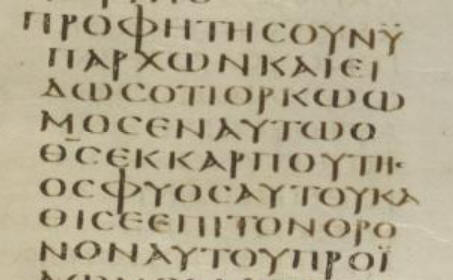Sinaiticus (א) was probably produced in Alexandria, Egypt, and was one of the 50 copies of the full Old and New Testaments (both in Greek; hence the OT was the LXX version) that was commissioned by the Emperor Constantine.
There are a couple of interesting things to notice here. First is that the screen capture includes the first word of verse 31 in the final line.
Second is that the word θεὸς is abbreviated as θ¯ at the beginning of the fifth line.
Using abbreviations for names of God is a practice that Christian scribes probably inherited from Jewish scribes, where it was considered a mark of reverence to not write the name of God out in full (or say the name of God out loud).
Next, the letter sigma is written like an English "C". Also, at the end of line five, the sigma is abbreviated as a dot.
We also see one example of a "textual variant". The first word on the seventh line is spelled καθισε in א, while the SBLGNT has settled on καθισαι as the most probable spelling in Luke's original (based on comparing א with other manuscripts).
Image of Sinaiticus
Transcribed with word breaks
SBLGNT version προφητηϲ ουν ϋ
παρχων και ει
δωςϲ οτι ορκω ω
μοσεν αυτω ο
θ¯ϲ εκ καρπου τηςϲ
οσφυοςϲ αυτου κα
θισε επι τον θρο
νον αυτου προϊπροφήτης οὖν
ὑπάρχων, καὶ
εἰδὼς ὅτι ὅρκῳ
ὤμοσεν αὐτῷ ὁ
θεὸς ἐκ καρποῦ τῆς
ὀσφύος αὐτοῦ
καθίσαι ἐπὶ τὸν
θρόνον αὐτοῦ
One of my take-aways from looking at just a single verse from Sinaiticus is the importance of feeling gratitude to people like Tregelles, Westcott, Hort, and others who have spent so many hours in small, dusty offices, staring at ancient manuscripts, and developing the easy-to-read editions of the Greek New Testament that we use today.
